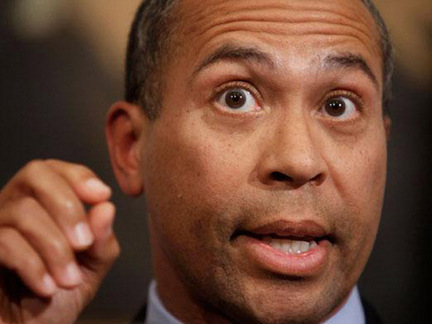In the upcoming months Massachusetts is expected to consider legislation that will dramatically change how health care providers get paid.
The goal of the approach, which has the support of Democratic Gov. Deval Patrick and his allies in the legislature, is to take away financial incentives to provide more care when less might be equally effective.
Instead of being paid through a traditional fee-for-service system, Massachusetts’ doctors and hospitals would instead be paid through global payment contracts (GPCs).
Under a GPC, a hospital or physician group accepts a flat fee for caring for a patient for a specified period of time, such as a month or a year. They generally have an opportunity to earn a bonus if their care meets quality thresholds.
According to Dr. JudyAnn Bigby, Massachusetts’ Secretary of Health and Human Services, the new legislation will include incentives that encourage providers to use alternatives to fee-for-service.
Physicians Disapprove of GPCs
While politicians may support the shift, most doctors don’t want anything to do with GPCs, according to a March 2012 survey by the Massachusetts Medical Society, which publishes the New England Journal of Medicine.
Many of the respondent physicians questioned some of the claimed benefits of moving to global payments, with the minority stating medical spending will decrease (44 percent) or quality will improve (19 percent) and the majority stating global payments will reduce physician incentives to work hard (59 percent).
More than three-quarters of respondents said transitioning to a global payment system would reduce the number of physicians willing to work in Massachusetts (76 percent).
Dr. Lynda Young, president of the Massachusetts Medical Society, said the survey findings showed “a one-size payment model does not fit all physician practices.”
“Some of the smaller physician practices may not have the technological infrastructure needed to make the shift easily and quickly,” Young said. “Any shift to a new payment system must adjust for risk, be fully transparent, include proper quality measurements and data, provide sufficient resources for proper patient care, meet patient expectations, and avoid unintended consequences.”
‘A Sharp Split’
Joshua Archambault, director of health care policy for the Massachusetts-based Pioneer Institute, says the Massachusetts Medical Society survey demonstrated “a sharp split” between doctors in large practices and those in smaller practices.
“What the survey showed was that if the doctor or physician worked in a hospital setting, they were more open to global payment contracts, whereas doctors in private practice were more opposed since they would have to radically alter their practice or hire someone with the necessary expertise to manage that side of the practice,” said Archambault.
Archambault said his primary concern is the risk global payments put on providers.
“Global payments should be part of the discussion, but I don’t think they are going to get us where we want to go in and of themselves,” he said.
Government-Forced Integration
Physician and author Doug Perednia says this payment approach is really nothing more than an attempt to force independent businesses to integrate into a single entity.
“There are already several examples of the ‘group payment’ model in operation today—they’re called Kaiser and the Veterans Administration. The only difference between a Kaiser and a nascent Accountable Care Organization (ACO) is that in the latter the physicians are not yet owned by the health system involved,” said Perednia.
Perednia says clinicians see the global payment approach as a threat to their ability to practice what’s best for the individual patient.
“Group payment is intended to force physicians out of independent practice and into positions of employment within hospitals and health systems. The ultimate goal is to be able to dictate exactly how they practice, what tests are done, and which medications and procedures they are allowed to use,” explained Perednia.
Roger Stark, a physician and health care policy analyst at the Washington Policy Center, agrees, noting global payment schemes are the basis for Health Maintenance Organizations (HMOs), medical homes, and ACOs.
“The emphasis for all these programs, and they are essentially the same, is on cost containment. The fewer [the] tests and procedures, the more money that theoretically can be saved,” says Stark. “We know HMOs can save money by rationing care, but the patients and doctors hated them.”
Exacerbating Doctor Shortage
Sally Pipes, president of the Pacific Research Institute, says the legislature has only itself to blame.
“The Massachusetts legislature painted themselves into a corner. They’ve got to cut costs just like every government that’s tried to provide health care to its citizens has had to cut costs. They plan on doing this by setting up global payment systems and rationing care,” says Pipes.
Unfortunately, she says, the first people that will be harmed by the new system will be seniors because they use so much health care.
“Under the new system, health care spending will be tied to growth in the economy. As taxes go up to pay for the health care in the state, there will be less growth in the economy. Then the reimbursement rates will be cut and doctors will give up seeing patients they can no longer afford to treat,” she explains.
Pipes says doctors in advanced specialties such as neurosurgery and obstetrics strongly oppose global payment systems, and imposing these systems will encourage them to retire early.
“This is going to exacerbate the shortage of doctors,” Pipes said.
Internet Resources:
Massachusetts Medical Society: Physician Survey on Global Payments: http://www.massmed.org/AM/Template.cfm?Section=Home6&CONTENTID=69867&TEMPLATE=/CM/ContentDisplay.cfm


